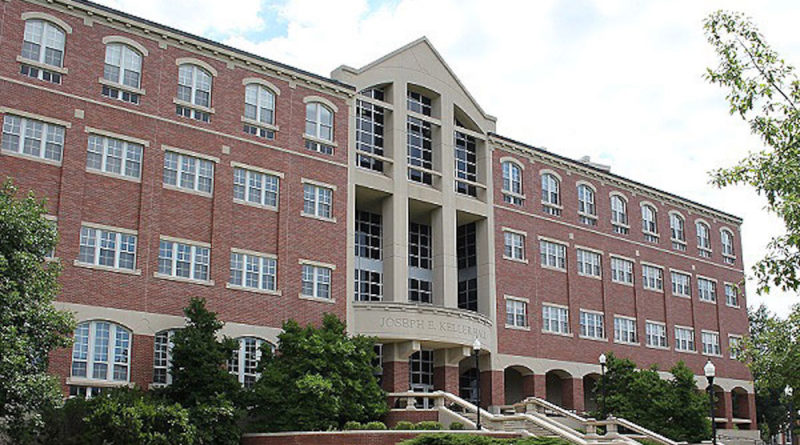University of Dayton Law School Celebrates Growth
Cover photo of Joseph E. Keller Hall, where UD’s Law School is housed, from University of Dayton
Sarah Frazier
Contributing Writer
The University of Dayton Law School (UDLS) has made tremendous improvements in the past four years.
The first major improvement has been the increase of the bar pass rate. Before changes were made in 2015, the UDLS bar pass rate was 70%, while the average in Ohio at that time was 80%.
However, in July 2019 the bar passage rate jumped up to 89%, well in front of the average Ohio pass rate of 82%. The jump from a 70% to 89% bar pass rate is one of the highest raises seen in law schools across the country and raised UD’s ranking to become third in the state.
UDLS Dean Andrew Strauss said he believes this improvement came mainly from changes to the way course material is taught at the law school. Most law schools teach using the Socratic teaching method, where students get called on randomly by their professor. However, there was a problem with this method because “only one student at a time is actually actively engaging,” Strauss said. With this previous teaching method, there is also only one exam at the end of the semester to test the students’ knowledge.
Therefore, UDLS decided to part from this method. It made smaller sections with only 25-40 students per classroom, gave multiple assessments, hired an academic success team that would help students individually if they were having issues, added legal learning labs where students are taught how to analyze cases, created a summer online review course for students who were struggling and made a three credit bar course.
Additionally, the school gave free housing over the summer to UDLS students in Caldwell Apartments to keep them in a structured environment with access to mentors and the bar support team. These factors that were implemented are all extremely unique for a law school to have, Strauss said.
The average undergraduate GPA at the UDLS went from 3.04 to 3.39 after these changes. Therefore, the school saw the GPA and bar results as proof that the changes were working.
Another major improvement was seen regarding the number of applications and the LSAT scores for incoming students. The number of applications to the UDLS went up from 639 in 2015 to 1062 in 2019, which was almost a 50% increase. The average LSAT score for entering students went from 148 in 2015 to 150 in 2019, with each point representing about 4% of the test taker population.
Strauss believes many of the new programs added to UDLS are attracting an increase in applications. Additionally, the school started collaborating with the UD Human Rights Center, the Hanley Sustainability Institute and LexisNexis (a computer data company that is commonly used by lawyers). The UDLS also added a system of concentrations, like majors, where students can concentrate in areas such as criminal justice, business law, intellectual properties, human rights, sustainability, etc.
Another implementation was one of the country’s first four online JD degrees. Since law schools tend to be conservative in terms of change and have not historically offered programs online, UDLS applied for an exception to this rule with the American Bar Association, and it was approved.
The online JD degree now offered by the UDLS “will revolutionize legal education because it allows people who could never go to law school otherwise to come to law school, and it’s almost a better way of teaching because it’s very interactive and you can do a lot of it on your own time,” Strass said.
UDLS also added a Leadership Honors Program for nominated students, which is tuition free.
Another factor believed to have contributed to the increase of applications was affordability, which has been a major goal for the school.
“We want students, especially UD students that really want to come here, to be able to afford to come here,” Strauss said. The biggest single item on the school budget is scholarship money by far, he added.
The UDLS is planning to add to its successes. It hopes to be more than just a JD program and more of a legal center. It is currently teaching students in Korea about U.S. law and is developing an online program for students in China, also for U.S. law.
“We really see the future of law as not just training people who are going to be professional full-time lawyers, but training people who deal with the law in their jobs,” Strass said.
The school hopes to have a diverse understanding of what law schools in this age should be doing and aspires to “keep inventing a new kind of legal education that has never been done before.”
If you are interested in touring the law school or have any questions, feel free to reach out to Assistant Dean Claire Schrader at 937-229-3555.
For more campus news like Flyer News on Facebook and follow us on Twitter (@FlyerNews) and Instagram (@flyernews)

